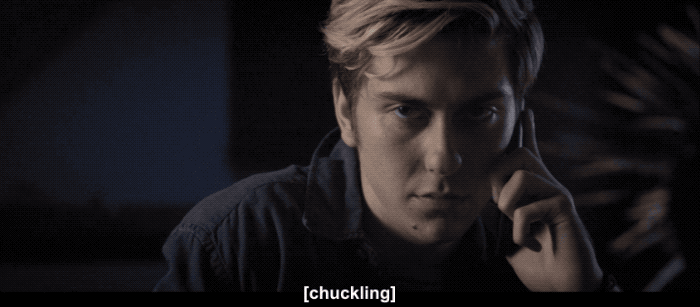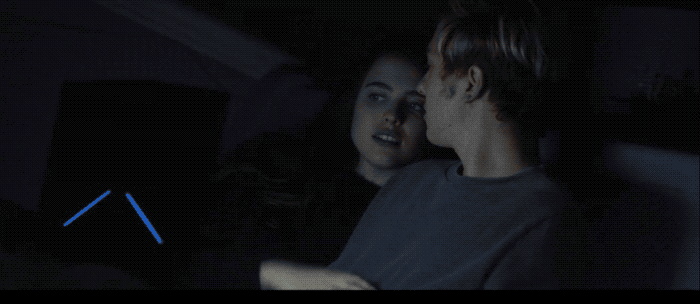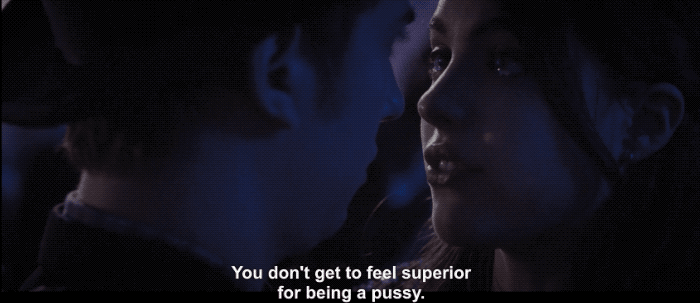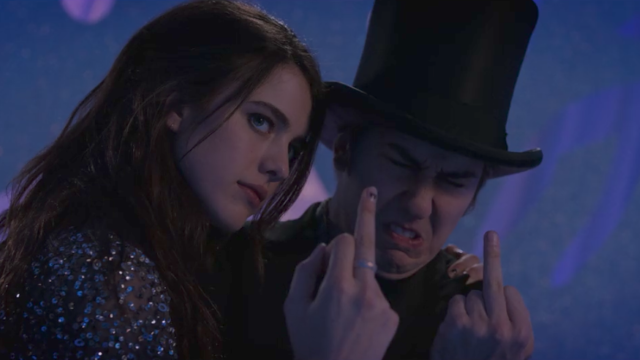The much anticipated and dreaded American adaptation of acclaimed anime and manga Death Note dropped on Friday. To our surprise, we kinda liked it.
Gita Jackson: Heather, Heather, Heather. How do we even begin this? We’re here to talk about the Netflix adaptation of Death Note, which is a movie we both definitely watched.
Heather Alexandra: I think we take a deep breath first because there are a lot of feelings to sort through. Tsugumi Ohba’s crime drama started as a manga in 2003 and became a big hit thanks to some intense mental chess games between its primary characters and a solid anime that even had a good dub.
There have been a ton of live action adaptations, but nothing like this. It’s fair to say that this version isn’t a good one-to-one adaptation of the material, but it’s still surprisingly entertaining.
Gita: I come into this from the exact opposite angle. I was never a huge fan of Death Note as a manga or anime, but I am a huge fan of horror movies, and director Adam Wingard is a horror rising star.
In terms of his oeuvre, which includes the critically acclaimed You’re Next and The Guest, this interpretation of Death Note is a perfect fit. It is gleefully self indulgent in terms of hitting all the visual and thematic notes he likes.
But it’s basically not Death Note. Like, if you’ve never seen or read the source material, I would recommend not looking into it before you see this movie.
Heather: Fans of the series might have a difficult time reconciling how different the characters are in this movie compared to the source material, but once you start to see it less as an attempt to recreate everything directly, it’s a fun ride.
The concept of the Death Note itself and being able to simply write a name to kill someone has always been darkly fascinating. You can do a lot with it, and I think this movie proves that.
Gita: Death Note was never going to work as a one-to-one adaptation for a lot of reason, most obvious being that it’s incredibly long and the twists and turns that fans like would not translate well in a truncated form.
I know it didn’t win him any love from anime fans, but I personally admire Wingard’s impulse to just tell a compelling story with the core concept rather than please the fanbase. This movie is actually barrels of fun. This movie is “what if John Hughes directed Final Destination?”
Heather: That’s especially true in the early parts. Light Yagami, here Light Turner, is a bit of a dweeb in this version. He’s not quite the calculating mastermind from the manga, at least not at the start.
He gets beat up in fights and screams like hell when he first sees Ryuk. Getting the Death Note is the start of a very slow turn to villainy that has as much decapitation as it does really hot hook-ups with his new girlfriend. But I guess we should get to that first part for a second here. The elephant in the room, as it were.

Gita: This movie is almost self consciously American, but that does not mean that it hasn’t been whitewashed to all hell. There are so few opportunities for Asian American actors in the States that the role of Light Turner really should have gone to one.
Heather: Let’s just be unambiguous about that right now: it’s stupid and there’s no reason you couldn’t have a Light Yagami in Seattle.
Gita: There is a huge Asian American population in the Pacific Northwest! It is very possible that Light Yagami could have lived in Seattle!
Heather: I’m all down for alternate retellings of things, but people were 100% right to point out the absurdity of that casting decision. It sticks out in my mind a lot too because for all of his on-point sneers and hot, smouldering glares, actor Nat Wolff might have been the weakest member of the cast.
Gita: Nat Wolff gets better near the end, but next to Margaret Qualley as Mia and especially Lakieth Stanfield as L, he sticks out as particularly bad. The opening moments of the movie, before you get introduced to those other characters, are definitely the worst parts, and that made it a hard sell for me and I imagine other viewers.
Heather: Wolff was one of my major hang ups, I think. The compelling thing about Light Yagami is his charisma in spite of the horrible things he does. The back and forth between him and L in the manga is based as much on their distinct personalities as it is their raw mental wit.
Here, I was mostly rooting for L due to Stanfield’s absolutely killer performance. He has the physicality, the mental acuity, and the raw charisma that Wolff never quite gets until much later in the film. And that’s not even getting into Willem Dafoe’s amazingly fun turn as Ryuk!
Gita: Ryuk was delightfully creepy. I didn’t think they could pull it off but he genuinely terrified me.
Heather: He’s also clearly enjoying himself, and the physical actor capturing everything else also really contributes to the part. Ryuk isn’t quite as quirky here, but he’s just as watchable as ever. Major kudos for making a shinigami feel suitably terrifying.
Gita: I think one thing that helped is that while there’s prominent and obvious use of CG, most of the mocap was done with Dafoe sitting on set wearing a hat that gave him the shinigami silhouette. His physicality as an actor made all his scenes have more weight.
He’s mostly in shadow as a clever way to make sure the CG doesn’t look too dated or cheap, and it adds this sense of dread whenever he shows up to mock and intimidate Light. Wingard is one of those guys who really puts an emphasis on practical effects, and it pays off here.
In general, it’s a great-looking movie, with very good lighting and a good sense of colour. And the gore is beautiful.
Heather: I wasn’t quite ready for how bloody it would be, but it hit a comfortable mix of camp and something a bit more primal. Each murder felt like a nasty teenager lashing out and a truly detached criminal coldly executing those he deemed unfit to live.
I don’t know if I completely bought Light as a character for a lot of the film, but I did believe in just how powerful “Kira” was.
Gita: I did mean it when I said Final Destination — this is a movie where you come out of it having a “favourite death.” Mine, for sure, was all the FBI agents walking off the roof. So striking, and then so, so bloody.
But I think this is a good chance for a brief sidebar to talk about Mia Sutton, who is based on the character Misa Amane in only the loosest terms. If anything, based on what I know of the Death Note fanbase, the changes made to this character we can all agree are for the better.
One of the first scenes with Sutton that really demonstrates the changes made here is a montage of her and Light hooking up, interspersed with shots of them using the Note to kill criminals and talking about how they’re going to become gods.
It is the sexiest thing I have seen on screen this year. Where Misa’s infatuation with Light made her weaker, Mia’s full blown relationship with him made her stronger and more interesting.
Heather: It also creates an interesting conflict compared to the manga. There, Misa is pretty subservient to Light, and the conflict shifts to a corporate businessman named Higuchi as someone else who has a Death Note. Here, there’s just one Death Note and two very driven people vying to use it.
It’s a tighter focus and arguably more interesting, especially by the end when she and Light are flat out in competition with each other.
Gita: What I especially like about how they develop as a couple is that 1) I sincerely believe that they are two selfish, horrible people in love, 2) I believe it when they both say that don’t fall out of love with each other despite both of them threatening to kill each other and manipulating each other, and 3) in the end, both Mia and Light decide that while their love for each other is genuine, they both love being a god way more.

Heather: And then they play Chicago’s “I Don’t Wanna Live Without Your Love” and it’s both the dumbest thing and also perfect. For real, the soundtrack in the movie is ridiculous.
Gita: The finale moments of this film are scored by Air Supply’s “The Power Of Love” and it’s just…. brilliant. Another fave is the goddamn homecoming dance scene, where they play “Don’t Change” by INXS.
Heather: I think some viewers might be put off by the lack of grand choruses and rocking Maximum the Hormone death metal, but in terms of fitting into that “John Hughes but with death gods” vibe it works well.
You know, the more we talk about it, the more I’m kinda starting to think I liked this movie in spite of how much it also didn’t necessarily feel like Death Note.
Gita: As I’ve stated, I don’t like Death Note. I don’t like how edgy the vibe is, and I didn’t get into the convoluted cat and mouse games. For a story about murder, there’s so many fucking rules!
What I do like is the core concepts that Ohba presented when they pitched the manga, which are “Everyone dies,” and “No one man should be a god.” This movie hits both those premises very hard, but it does them in a way that is a huge departure from the source material.
Heather: I personally wanted some more time with L and Light really going back and forth in those mind games. A big dynamic of the manga is built around those two characters, but it’s almost completely absent here aside from one scene.
But insofar as weaving a story about how messed up having this power is, the movie worked. Can we talk about the ending? That’s where the movie went from “trash” to “good trash” for me. Everyone’s really on point.
Gita: One thing before the ending: Lakieth as L. Lakieth! As L! Man, best performance in the movie, hands down. Dude was out of control, just riveting to watch.
Heather: Haha. Yeah, I guess I blazed over that a bit. He’s so good and is both this really smooth criminal investigator and super vulnerable kid living in his own mental world. It helps that Stanfield is probably one of the most expressive actors out there right now. He paints a clear picture of whatever L is thinking at any given moment.
Gita: It’s the exact opposite of how L is in the anime and manga, yet I can’t say that this interpretation of L feels like a departure in the way that Mia and Light do. This is Stanfield bringing life to the character through his own reading.

Heather: Most of the beats are there. That sense of justice, a raw arrogance when he’s right, and a vague disconnect from other people. It’s not just that he’s emulating L’s body posture; there’s a lot more going on here.
Stanfield’s eyes wander a lot, he invades other people’s space in small but meaningful ways, and when he finally snaps after Watari’s death, who was his father figure and mentor, his focus is incredible.
Gita: Now I think it’s time to bring it to the last 20 or so minutes of the movie, where Stanfield, and everyone else, really, really shines.
Heather: It’s really good.
Gita: It’s goddamn great. Holy shit. Where to start.

Heather: Right, so Mia wants the book and writes Light’s name in it. Meanwhile, L just lost Watari and is dead-set on revenge. Light’s balancing two threats and handles it pretty masterfully. At first, I thought it was bullshit. I didn’t put together the fact that he managed to write so much stuff in the Death Note before everything really played out.
Gita: There’s a Final Destination as hell death sequence on a ferris wheel — one of those horror movie cop out, Rube Goldberg death machine things. I thought the movie was finally leaning into the camp wholeheartedly and just being gleefully stupid.
And then. And then! Light’s dad shows up at the hospital, where Light has been in a coma for two days. L is sent away in disgrace because Kira has continued killing during this times. But Light’s dad is like, “Hey son. I know you’re Kira.”
Heather: Which is a difference again from the manga, where Soichiro dies thinking Light definitely isn’t Kira.
Gita: Here it works so well because literally every character you’ve met in the movie gets what they want. This is what I meant when I was saying it hits one of the core premises of Death Note so hard — Light is a god and had the power to give everyone in his life what they want.
Light’s dad find Kira. L solves the case. Mia gets the Death Note, and Light finally wins. But they’re not happy. Oh boy, are they not happy. The image of Light in this hospital bed is the image of utter misery, even after he’s pulled off the greatest con in the entire movie.
Heather: Meanwhile, L has a piece of the Death Note and is possibly seconds away from writing Light’s name and committing the same type of killing that Kira was: using the book to rid the world of a deadly criminal.
Gita: Ryuk appears, cackling. He says, in the first and only piece of fan service, “You humans are so interesting.” End of movie.
Heather: The start of the movie felt interminable to me, and I was having so much trouble sorting out the difference from the source material, but this ending felt just as strong as anything I might have found in the manga. The role reversals, the intense plotting from Light, Ryuk’s sinister enjoyment of it all — it was all there. And, yes, as you mentioned on Twitter, the best use of Air Supply’s “Power Of Love” ever put into a movie.
Gita: Hey, Adam Wingard retweeted that! I’m glad he knows that his efforts were appreciated. He’s getting a lot of shit on Twitter and I understand why — this is not really an adaptation of Death Note. It’s a movie with the same core concept and similar characters, but it’s its own beast. And that’s fine. There’s a long manga and 37 episode anime if you want a faithful one-to-one adaptation. But I enjoyed this movie, warts and all. By the end, I even liked Nat Wolff.

Comments
10 responses to “What We Mostly Liked About Netflix’s Death Note”
I enjoyed it, it even made me decide to go and actually watch the anime
The anime is very popular for a reason so I hope you enjoy it!
As someone who is definitely a fan of the anime and manga, I was able to enjoy this. You could never faithfully reproduce everything that makes the source material so outstanding in a standard length film but it was good for what it was. Once you accept that it’s not trying to be the original then you can just go along for the ride. I hope that it brings some new fans to the anime and manga.
Was it a good Death Note movie? No. Was it a good movie? I enjoyed it the same way I enjoy the Final Destination movies. As long as you turn your expectations right down it’s a great popcorn flick. Definitely what I expected from an Americanisation of Death Note.
Wasn’t there an article on here last week saying that it was crap?
*confused*
I don’t want to blow your mind but different writers have different opinions.
That’s one of things I like about Kotaku, there’s articles discussing games/movies from different points of view.
Next you’ll be telling me that David and Margaret sometimes disagreed with each other.
Except in the case of I Now Pronounce You Chuck and Larry, in which case they were in perfect agreement.
I went into this movie completely expecting it to be horrible…and I was pleasantly surprised. Mind you, it’s definitely not the Anime, or even Live Action version, but it is a movie based on the same premise. If they had changed all the characters names, and just the Death Note be a new version found in America, maybe brought there by Ryuk..I think that would have made a lot more people happy. All that being said, it was a decent enough movie, I don’t feel like my time was wasted, plus it was on Netflix, so it’s not like I went out of my way to watch it…some people are seriously over-reacting to you…I mean…it’s no Eragon..*SHIVER*
Well I’m just here to add my voice to the “did not enjoy it” camp. I didn’t enjoy the teen romance part of the story. And the fact that the movie leaned extremely heavily on “you can control someone up to 2 days before death”. It was used as a get out of jail card every single time. In fact is was stretched sooo much that in the last scene all manner of things could suddenly be controlled, like where a page of a death note could be blown by the wind into a fire, or how Light’s fall and revival was also controlled somehow, despite him not dying. You say the last 29 mins was the best? I say it was the most difficult part to watch, because the writers were forced to write a clever climax which they were not ready for. It all started with Mia writing light’s name and demanding the book. What was she expecting? Even the dumbest person would just go ahead and write her name in as well. After that it was pretty downhill. It tried to be clever but in my opinion failed miserably. Points for the cinematography and performances as mentioned above. But the story was terrible